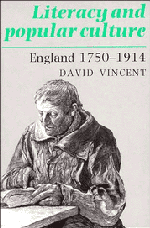Summary
The accounts left to us by working men and women who gained sufficient mastery of the tools of literacy to write about themselves tended to be extremely reticent where strong feelings might be involved. For reasons of literary convention and authorial intention the narratives were oblique and generalised on sexual and domestic relations. However, when it became necessary to describe the impact of reading on the imagination, a complete thesaurus of emotional language was deployed. Literature ranging from chapbooks to Shakespeare evoked ‘rapture’, ‘wonder’, ‘joy’, ‘desire’, ‘delight’ and ‘pleasure’. To those making their first encounter with books, it mattered little whether they were designed merely to entertain or had some higher purpose. ‘The story was the great thing’, recalled the plasterer's son William Adams – ‘the trials of Christian, the troubles of Gulliver, the adventures of Aladdin.’ Even where subsequent intellectual pursuits were confined to the factual or the spiritual, it was admitted that the simple, all-consuming enjoyment of fiction had played a crucial role in translating the barely literate schoolchild into the fully fledged reader. Most never lost their taste for the fabulous in all its forms, as outside observers were continually discovering as they monitored the progress towards universal literacy. ‘The general results, then, of our enquiry’, concluded the Fortnightly Review in 1889, ‘are first, that there is an forms of literature, and, secondly, that there is a decided preference for books of a highly sensational character.’
- Type
- Chapter
- Information
- Literacy and Popular CultureEngland 1750–1914, pp. 196 - 227Publisher: Cambridge University PressPrint publication year: 1989
- 1
- Cited by



